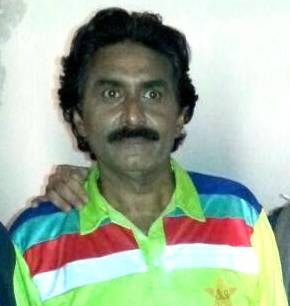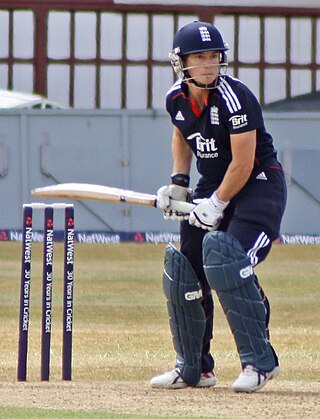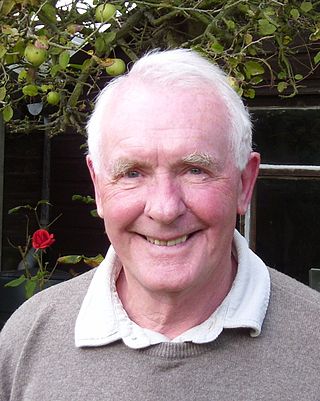
The 2003 ICC Cricket World Cup was the eighth Cricket World Cup, organised by the International Cricket Council (ICC). It was co-hosted by South Africa, Zimbabwe and Kenya from 9 February to 23 March 2003. This edition of the World Cup was the first to be played in Africa.

The 1996 Cricket World Cup, also called the Wills World Cup 1996 after the Wills Navy Cut brand produced by tournament sponsor ITC, was the sixth Cricket World Cup organised by the International Cricket Council (ICC). It was the second World Cup to be hosted by Pakistan and India but Sri Lanka were hosts for the first time. The tournament was won by Sri Lanka, who defeated Australia by seven wickets in the final on 17 March 1996 at the Gaddafi Stadium in Lahore, Pakistan.

The 1992 Cricket World Cup was the fifth Cricket World Cup, the premier One Day International cricket tournament for men's national teams, organised by the International Cricket Council (ICC). It was held in Australia and New Zealand from 22 February to 25 March 1992, and finished with Pakistan beating England by 22 runs in the final to become the World Cup champions for the first time. The tournament is remembered for the controversial "rain rule".
The 1983 Cricket World Cup was the 3rd edition of the Cricket World Cup tournament. It was held from 9 to 25 June 1983 in England and Wales and was won by India. Eight countries participated in the event. England, India, Pakistan and West Indies qualified for the semi-finals. The preliminary matches were played in two groups of four teams each, and each country played the others in its group twice. The top two teams in each group qualified for the semi-finals.

The 1987 Cricket World Cup was the fourth Cricket World Cup. It was held from 8 October to 8 November 1987 in India and Pakistan – the first such tournament to be held outside England. The one-day format was unchanged from the eight-team 1983 event except for a reduction in the number of overs a team played from 60 to 50, the current standard for all ODIs.

Mohammad Javed Miandad PP SI, popularly known as Javed Miandad, is a Pakistani cricket coach, commentator and former cricketer known for his unconventional style of captaincy and batting. ESPNcricinfo described him as "the greatest batsman Pakistan has ever produced" and his contemporary Ian Chappell extolled him as one of the finest batsmen in the history of cricket.

Ravishankar Jayadritha Shastri is a former head coach of the India national cricket team and a cricket commentator. As a player, he played for the India national cricket team between 1981 and 1992 in both Test matches and One Day Internationals. Although he started his career as a left arm spin bowler, he later transformed into a batting all-rounder. Shastri was a member of the Indian team that won the 1983 Cricket World Cup.He won C.K Naydu lifetime achievement award at Indian cricket team annual award show NAMAN on 24/01/2024.
The England cricket team toured Australia during the 1986–87 cricket season for a five-match Test series to contest The Ashes. While in Australia, England also played a number of tour matches against state and representative teams, and competed in two One-Day International (ODI) tournaments. Under the captaincy of Mike Gatting, England retained the Ashes with a 2–1 series win.

Samantha Claire Taylor is a former cricketer who represented England more than 150 times between 1998 and 2011. A top order batter, Taylor was the first woman to be named a Wisden Cricketer of the Year. Along with Charlotte Edwards, she was the mainstay of England's batting during the first decade of the 21st century, and played a key role in the team's two world titles in 2009.

India has won the Cricket World Cup twice, once in 1983 and then in 2011. India finished as runners-up in 2003 and 2023.
The 1979 Cricket World Cup was the second edition of the Cricket World Cup. Organised by the International Cricket Conference, it was held in England from 9 to 23 June 1979.
The final of the 1979 ICC Cricket World Cup was played in Lord's, London on 23 June. This was the second time that Lord's had hosted an ICC Cricket World Cup final. The match was won by the West Indies when they defeated England by 92 runs to lift the trophy.

The 1987 Cricket World Cup Final was a One Day International (ODI) cricket match played at Eden Gardens in Calcutta, India, on 8 November 1987 to determine the winner of the 1987 Cricket World Cup. It was contested by Australia and England, both of whom had yet to win the trophy. The 1987 World Cup was the first World Cup to be hosted outside of England; it was also the first World Cup to feature a 50-over per side match format and the first time the final had been hosted at a venue other than Lord's. It is reported that 95,342 spectators attended the match.

The 2003 Cricket World Cup Final was a One Day International (ODI) match played on 23 March 2003 at the Wanderers Stadium in Johannesburg, South Africa. It marked the culmination of the 2003 Cricket World Cup, the eighth edition of the tournament. It was the first time these two teams had met at this stage of a World Cup. For defending champions Australia it was their fifth World Cup final, while for India it was the second after their 1983 victory. Australia won the match by 125 runs to claim the title for the third time.
The 1996 Singer Cup was a triangular cricket tournament held between 1 and 7 April 1996 in Singapore. The competition featured the national cricket teams of India, Sri Lanka and Pakistan. The tournament was won by Pakistan, which defeated Sri Lanka in the final on 7 April.

The 1998 ICC KnockOut Trophy was a One Day International (ODI) cricket tournament held in Bangladesh. It was the first tournament apart from the World Cups to involve all Test playing nations. The winners of the Knock-out stage—India, South Africa, Sri Lanka and Indies—reached the semi-finals. South Africa made their way to the final by defeating Sri Lanka in the first semi-final by 92 runs; the match was reduced to 39 overs per innings due to rain. In the second semi-final, West Indies defeated India by six wickets, and qualified for the final.

The England cricket team have appeared in every edition of the Cricket World Cup to date, being crowned champions in 2019. In addition, they were losing finalists in 1979, 1987 and 1992. England have been eliminated from the tournament in the group stage on five occasions
Pakistan cricket team won the World Cup in 1992 under the captaincy of Imran Khan. Pakistan have also been runners up at the 1999 Cricket World Cup where they lost to Australia in the Final. They have been Semi Finalists four times and have also reached the Quarter Finals twice. Pakistan's historical win–loss record at the cricket world cup is 49-36, with 3 no results. Javed Miandad has appeared in six Cricket World Cups which is more than any other player from Pakistan.

The 1985 World Championship of Cricket Final was a One Day International (ODI) match played on 10 March 1985 between India and Pakistan at the Melbourne Cricket Ground, Melbourne. Popularly known as World Championship of Cricket, this ODI tournament was held from 17 February to 10 March 1985 in Australia and it marked the culmination of the only World Championship of Cricket with India defeating Pakistan by 8 wickets.












